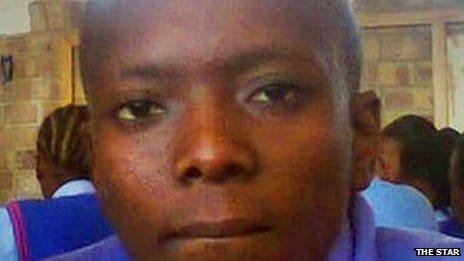Sixteen-year-old student Sizwe Kubheka (pictured) of Palm Springs, South Africa, recently died, after his teacher allegedly beat him in class, according to BBC.
SEE ALSO: Kenya’s Church Raid: Bullet Removed from Boy’s Brain
On March 17th, Sizwe reportedly came home and told his mom, Maria, that he was suffering from a headache. That fateful Monday was reportedly the same day Sizwe had been disciplined by his teacher for being caught with another student making noise in class.
The unnamed teacher reportedly punished Sizwe by beating his head with a belt.
Keep Up With Face2Face Africa On Facebook!
Since both Maria and her husband are unemployed, they couldn’t afford to take their son to the hospital. Trying to make the best out of a bad situation, Maria reportedly resorted to giving Sizwe painkillers.
But the painkillers wouldn’t stop Sizwe’s hearing from disappearing and head from becoming severely swollen, among other problems.
Just before Sizwe ultimately passed, Maria explained her son’s condition, “My boy was deaf just before he died. He couldn’t even hear or see us when we spoke with him at his bedside.”
Since corporal punishment was banned in schools in 1996, Sizwe’s teacher was initially arrested and charged with corporal punishment, but now that Sizwe has died, the teacher will be charged with murder if Sizwe’s autopsy indicates that he passed due to his teacher’s abuse.
Police spokesman Tshishiwa Mitileni added, “If the results indicate that the cause of death was due to assault injuries, then the charge will change to murder.”
As aforementioned, while corporal punishment was ended in South Africa nearly a decade ago, according to published reports, many teachers continue to use it on unruly students. In fact, according to a survey conducted in the country on 410 students in 2004, while corporal punishment happens the most to students in rural areas, virtually no student — irrespective of his or her socioeconomic status — is exempt from being beaten:
Boys and girls of all ages and from all different income categories received corporal punishment at home with the exception of children from environments with the highest incomes and children from Indian communities, where almost no cases of corporal punishment were reported. Most children were beaten with a belt. Children from low-income environments were exposed to the most severe forms of corporal punishment in the home and at school. The frequency of corporal punishment decreased as children got older. The study also found a general, but not definite, pattern of corporal punishment being more commonly experienced by children in rural rather than in urban areas.
SEE ALSO: Ghana Partners With Yale to Eliminate Mother-to-Child HIV
[advpoll id=”3″ title=”Advanced Poll” width=”270″]










